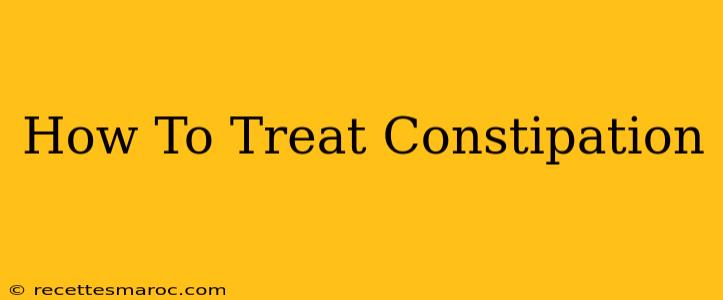Constipation is a common digestive problem characterized by infrequent or difficult bowel movements. It can be uncomfortable and even painful, significantly impacting your quality of life. Fortunately, there are many effective ways to treat constipation, ranging from simple lifestyle changes to medical interventions. This comprehensive guide will explore various strategies to help you find relief and maintain regular bowel movements.
Understanding the Causes of Constipation
Before diving into treatment options, it's crucial to understand what might be causing your constipation. Several factors can contribute, including:
- Diet: A diet low in fiber is a major culprit. Fiber adds bulk to your stool, making it easier to pass.
- Dehydration: Insufficient water intake hardens your stool, leading to constipation.
- Lack of Exercise: Physical activity stimulates bowel movements. A sedentary lifestyle can worsen constipation.
- Medications: Certain medications, such as pain relievers (opioids), antidepressants, and some antacids, can cause constipation as a side effect.
- Ignoring the Urge: Delaying bowel movements can lead to harder stools and increased difficulty passing them.
- Medical Conditions: Underlying medical conditions like irritable bowel syndrome (IBS), hypothyroidism, and diabetes can also contribute to constipation.
- Pregnancy: Hormonal changes and pressure from the growing uterus during pregnancy often cause constipation.
Effective Ways to Treat Constipation
The best approach to treating constipation depends on its severity and underlying cause. Here are several effective strategies:
1. Lifestyle Changes: The Cornerstone of Treatment
Dietary Adjustments:
- Increase Fiber Intake: Gradually increase your fiber intake by adding more fruits, vegetables, whole grains, and legumes to your diet. Aim for the recommended daily intake of fiber.
- Drink Plenty of Fluids: Staying hydrated is essential for softening stool. Drink plenty of water, clear broths, and other fluids throughout the day.
Physical Activity:
- Regular Exercise: Engage in regular physical activity to stimulate bowel movements. Even a moderate amount of exercise can make a difference.
Developing Healthy Bowel Habits:
- Listen to Your Body: Don't ignore the urge to have a bowel movement. Respond promptly when you feel the need.
- Establish a Routine: Try to go to the toilet at the same time each day, even if you don't feel the urge. This can help regulate your bowel movements.
2. Over-the-Counter Remedies
Several over-the-counter remedies can provide relief from constipation:
- Bulk-Forming Laxatives: These laxatives absorb water in the intestines, softening the stool and making it easier to pass. They are generally considered safe for long-term use.
- Stool Softeners: These help prevent hard stools by adding moisture. They are gentle and can be helpful for preventing constipation.
- Osmotic Laxatives: These draw water into the intestines, softening the stool and stimulating bowel movements. They work quickly but shouldn't be used long-term.
- Stimulant Laxatives: These stimulate the muscles in the intestines to contract and move stool. They should only be used occasionally, as prolonged use can lead to dependence.
3. When to Seek Medical Attention
While many cases of constipation can be effectively managed at home, you should seek medical attention if:
- Constipation is severe or persistent: If you've experienced constipation for several weeks despite trying home remedies.
- You experience rectal bleeding or pain: These symptoms could indicate a more serious underlying condition.
- You have sudden changes in bowel habits: A significant change in bowel frequency or consistency could warrant a doctor's visit.
- You have abdominal pain or bloating: These symptoms can indicate a problem that requires medical attention.
Prevention is Key
Preventing constipation is often easier than treating it. By adopting a healthy lifestyle that includes a high-fiber diet, regular exercise, and adequate hydration, you can significantly reduce your risk of developing constipation.
Disclaimer: This information is intended for educational purposes only and should not be considered medical advice. Always consult with a healthcare professional for diagnosis and treatment of any medical condition.

